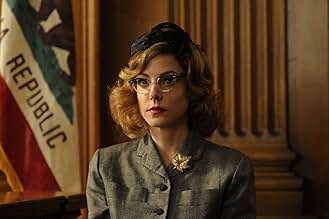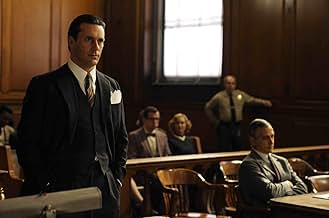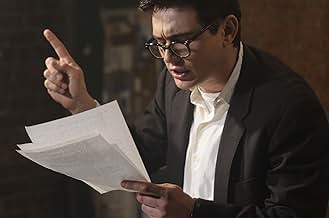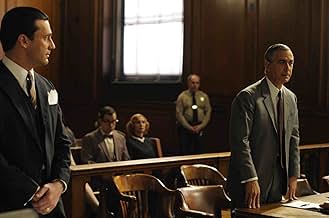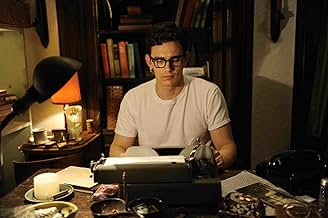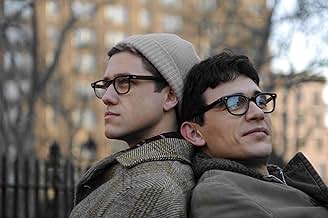VALUTAZIONE IMDb
6,6/10
13.589
LA TUA VALUTAZIONE
Nella San Francisco del 1957, un capolavoro di letteratura americana fu portato sul banco degli imputati.Nella San Francisco del 1957, un capolavoro di letteratura americana fu portato sul banco degli imputati.Nella San Francisco del 1957, un capolavoro di letteratura americana fu portato sul banco degli imputati.
- Regia
- Sceneggiatura
- Star
- Premi
- 2 vittorie e 8 candidature totali
Kaydence Frank
- Allen's Girlfriend
- (as Kadance Frank)
Allen Ginsberg
- Self
- (filmato d'archivio)
Recensioni in evidenza
In admiration of James Franco and his portraying a literary person is why I wanted to see this film. Since I'd never read the poem "Howl" by Allen Ginsberg (& I knew of Ginsberg in his later years as he was fairly renown as almost an elder poet statesman), I actually dug up a copy of "Howl" and read it before I viewed the movie. It turns out that it wasn't necessary to have read "Howl" -- the film sufficiently presents the poem and its complete text so that the viewer gets a good understanding just from the movie itself (at least I thought so...). This occurs in not only Franco's public reading of "Howl," it is brought out in the animation aspect of the film -- for me the animation was unexpected yet not intrusive. What is the film's major strength is James Franco's portrayal of Ginsberg. Franco's actual physical resemblance to the younger Ginsberg adds to his portrayal and his public reading of "Howl" is also quite good.
What is additionally satisfying in my mind is the evoking of a time and place (mid 1950s America) when a group of writers and quasi-vagabonds lived their lives on their own terms (& not in accordance to what was then considered the status quo) and wrote about it. This is brought out in depictions of Ginsberg's relationships and also in the court room obscenity battle about "Howl."
What is additionally satisfying in my mind is the evoking of a time and place (mid 1950s America) when a group of writers and quasi-vagabonds lived their lives on their own terms (& not in accordance to what was then considered the status quo) and wrote about it. This is brought out in depictions of Ginsberg's relationships and also in the court room obscenity battle about "Howl."
'Howl (2010)' is an offbeat experimental historical film about Allen Ginsberg's 1956 poem "Howl," the subject of a highly-publicised obscenity trial on its initial publication. James Franco plays Ginsberg, the reluctantly homosexual poet who poured his fears and frustrations into a four-part magnum opus, deemed a masterpiece and an obscenity in equal measure. I haven't read all that much poetry (though I have been known to recite Poe's "The Raven" in my most Vincent Price-ish voice), but I did like Ginsberg's poem, which is lyrical and evocative in a manner resembling the songwriting of Tom Waits. Several computer-animated sequences attempt to ascribe visuals to Ginsberg's words, but I wasn't sure about these: the CGI animation seemed too clean, too ordered, to represent such inner torment. Worth seeing, but perhaps not for everyone.
Rob Epstein and Jeffrey Friedman's 'Howl' is an interesting and humorous depiction of the 1957 trial regarding Allen Ginsberg's controversial poem 'Howl'. In between the trial we are given glimpses of Ginsberg's life (in black and white) and an interview with him. The black and white sequences are beautifully shot. The style reminds one of French movies from the 50s. The recital of the poems takes some getting used to but once it is coupled with the animated sequence there's no turning back. It brings the poetry to life. Those are the highlights of the film. Moreover the animation is beautifully done. The pacing is uneven as its slow at times (especially in the beginning). I would have liked to have seen more glimpses of Ginsberg's life. The actors do a fairly decent job. James Franco does a good enough job and he is well supported by David Strathairn, Jon Hamm, Bob Balaban, Alessandro Nivola and Mary-Louise Parker. Overall, 'Howl' is an intriguing account and does quite well in introducing Ginsberg's poems to those who are not familiar with his works. The animation gives it a unique touch.
Howl might be a one-of-a-kind film experience if not for Chicago 10, another film that blended documentary, dramatization and animation together into a blender of personal history. But what sets this film apart from that and all others is that poetry becomes interwoven into a courtroom trial procedural - all, apparently, taken from the actual court transcripts of what the prosecution/defense asked of the people on the stand - so that it becomes about free speech. At the same time it's a quasi-biopic on Allen Ginsberg, who was a real free spirit, but also a shy Jewish kid from New York city who lost his mother as a child and worried about writing poems that might irk the ire of his father (he even considered not publishing Howl for that reason).
It's a beautifully surreal little treat of a film that treats its subject seriously while also giving life to the epic poem that stays timeless, as with Walt Whitman's Leaves of Grass (which also gets name- dropped here). The filmmakers bring together the poetic readings - done by James Franco, one of his real 'embodiment' performances like Saul in Pineapple Express that is basically stunning - from in front of a live audience (where one sees how Ginsberg at first has an audience patient and waiting and then is full of life and looking forward to every next thing he says) and in animation. The poem becomes alive through the low-budget drawings, and depending on the stanza it can be at least acceptable and at most mind-blowing. You almost want the poem to go longer to sink in deeper to those Ginsberg stanzas that flow out with what appears to be stream of consciousness, but really has a structure to it.
Acting is fantastic - David Straithairn, Jon Hamm and in a one-scene keeper Jeff Daniels - Franco keeps things moving so well with his performance, and the poem is given it's best context in personal and social history. All of a sudden, thanks to a film like this, the material becomes alive again, like a student picking it up and sinking into it for the first time.
It's a beautifully surreal little treat of a film that treats its subject seriously while also giving life to the epic poem that stays timeless, as with Walt Whitman's Leaves of Grass (which also gets name- dropped here). The filmmakers bring together the poetic readings - done by James Franco, one of his real 'embodiment' performances like Saul in Pineapple Express that is basically stunning - from in front of a live audience (where one sees how Ginsberg at first has an audience patient and waiting and then is full of life and looking forward to every next thing he says) and in animation. The poem becomes alive through the low-budget drawings, and depending on the stanza it can be at least acceptable and at most mind-blowing. You almost want the poem to go longer to sink in deeper to those Ginsberg stanzas that flow out with what appears to be stream of consciousness, but really has a structure to it.
Acting is fantastic - David Straithairn, Jon Hamm and in a one-scene keeper Jeff Daniels - Franco keeps things moving so well with his performance, and the poem is given it's best context in personal and social history. All of a sudden, thanks to a film like this, the material becomes alive again, like a student picking it up and sinking into it for the first time.
This is a brilliant film. I have not seen a another film that successfully shows how someone creates a work of art, especially a literary work. This film does it brilliantly, largely by quotations from the poem read very effectively by James Franco, who plays Ginsberg. Acted out interviews illuminate many things and the trial itself is extremely involving to watch. Even the animated portions we see while we hear parts of the poem work well. It's a remarkable film about artistic creation and how the artist must be allowed to use his own words and to use language that expresses his meaning fully, not language that is inoffensive to some imaginary reader.
Franco, John Hamm, David Strathairn, Bob Balaban, Jeff Daniels are all at their best, and seem truly committed to the project.
You don't even have to be a fan of Ginsberg, or know much about who he was to enjoy this. I was really impressed, one of the best films of this year, but it will likely be ignored by many.
Franco, John Hamm, David Strathairn, Bob Balaban, Jeff Daniels are all at their best, and seem truly committed to the project.
You don't even have to be a fan of Ginsberg, or know much about who he was to enjoy this. I was really impressed, one of the best films of this year, but it will likely be ignored by many.
Lo sapevi?
- QuizShot in 14 days around New York City in March/April 2009.
- BlooperAbout 29 minutes in, Franco (as Ginsberg) lights up a cigarette. You can clearly see a layer of digital shading (meant to darken Franco's beard) that is overlaid onto his face, esp. his left jaw. This shading also goes over Franco's hand in this scene.
- Citazioni
Allen Ginsberg: There's no beat generation. It's just a bunch of guys trying to get published.
- Colonne sonoreTonight at the Sands
Written by Jack Arel and Jean-Claude Petit (as Jean-Caude Petit)
ZFC Music (ASCAP)
Courtesy of FirstCom Music
I più visti
Accedi per valutare e creare un elenco di titoli salvati per ottenere consigli personalizzati
- How long is Howl?Powered by Alexa
Dettagli
Botteghino
- Lordo Stati Uniti e Canada
- 617.334 USD
- Fine settimana di apertura Stati Uniti e Canada
- 51.185 USD
- 26 set 2010
- Lordo in tutto il mondo
- 1.614.810 USD
- Tempo di esecuzione1 ora 24 minuti
- Colore
- Mix di suoni
- Proporzioni
- 1.85 : 1
Contribuisci a questa pagina
Suggerisci una modifica o aggiungi i contenuti mancanti








